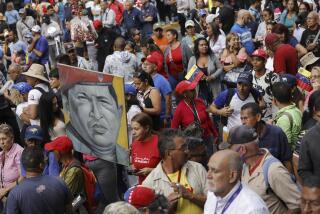POLITICS : Zimbabwe Vote Days Away, but Victor Is Certain
- Share via
NORTON, Zimbabwe — With national elections starting Saturday, President Robert Mugabe’s campaign rally here this week was typical.
He kept his suit coat buttoned and tie tightly knotted despite sweltering heat. He was flanked by Cabinet ministers, generals in gleaming medals and bodyguards armed with assault rifles and scowls. His new helicopter drew far more attention than his hourlong speech.
The 71-year-old president pleaded for votes, ridiculed critics and promised hospitals, schools and roads to several thousand bused-in schoolchildren, farmers and local officials who applauded politely, if not enthusiastically.
The question was why Mugabe even bothered. Fifteen years after white-ruled Rhodesia became black-ruled Zimbabwe, Mugabe’s ruling Zimbabwe African National Union-Patriotic Front party is so firmly entrenched in power that the parliamentary election this weekend--the third since independence in 1980--is almost a formality.
So few opposition candidates have registered to run that Mugabe is assured a majority before the first vote is cast. His party held 147 of the 150 seats in Parliament after the 1990 election.
That, of course, is no accident. The government controls all radio, TV and every major newspaper. It provides the ruling party $4.2 million a year in taxpayers’ money, but none to the tiny opposition. Mugabe appointed the commission that will oversee the balloting, and has refused calls for international monitors.
So will it be a free and fair election?
“I don’t know,” Mugabe said in a brief interview after the rally. “Why not? The people are going to vote. No one is forcing anyone to vote in any direction. So yes, it will be a democratic vote. Why not?”
His critics give lots of reasons, ranging from intimidation of voters to a voters’ list so riddled with inaccuracies that it may contain up to 1 million fraudulent names, according to a Western diplomat.
John Makumbe, a political scientist at the University of Zimbabwe, is less charitable. “He’s created a de facto one-party state,” he said.
Makumbe said the president’s challenge now is to overcome the apathy, distrust and frustration among the 4.5 million registered voters.
“There’s a very strong likelihood he’ll only get 30% to 35% turnout,” he said. “That’s Mugabe’s horror. Because it says the legitimacy of his government is in question.”
Mugabe’s rule has created a stable government in a continent fraught with collapsing nation-states and tribal bloodletting. There is little racial or ethnic tension, and schools and medical care are vastly improved.
Mugabe has discarded ruinous socialist economic policies for a strict World Bank regimen of free-market reforms. And the brutal police-state tactics of the 1980s are no longer in evidence.
“This has been a relatively peaceful election so far,” a Zimbabwe Human Rights Assn. spokesman said.
Others say the pragmatic Mugabe has simply realized that he no longer needs to be heavy-handed. The political opposition is bitterly divided and largely impotent.
The leader of the largest opposition group, Enoch Dumbutshena of the Forum Party, considered campaigning so useless that he left the country for the final week.
“What we are boycotting is not elections, but fraudulent elections,” said Abel Muzorewa, head of the United Parties and a retired black clergyman who served as prime minister in the final days of white rule. “Mugabe could not win free and fair elections.”
That’s not necessarily true. Mugabe remains revered as the leader who won the eight-year bush war against Ian Smith’s renegade white regime. Even some of Mugabe’s fiercest critics say they do not oppose him, just his autocratic style and the ministers around him.
Former guerrilla leader Margaret Dongo launched an insurgent campaign against a local ZANU-PF candidate after she was suspended from the party for questioning its policies in Parliament.
“They don’t want people to criticize them,” she said. But she insisted that she wants to reform the party: “It’s betraying the revolution at the end of the day.”
More to Read
Sign up for Essential California
The most important California stories and recommendations in your inbox every morning.
You may occasionally receive promotional content from the Los Angeles Times.














